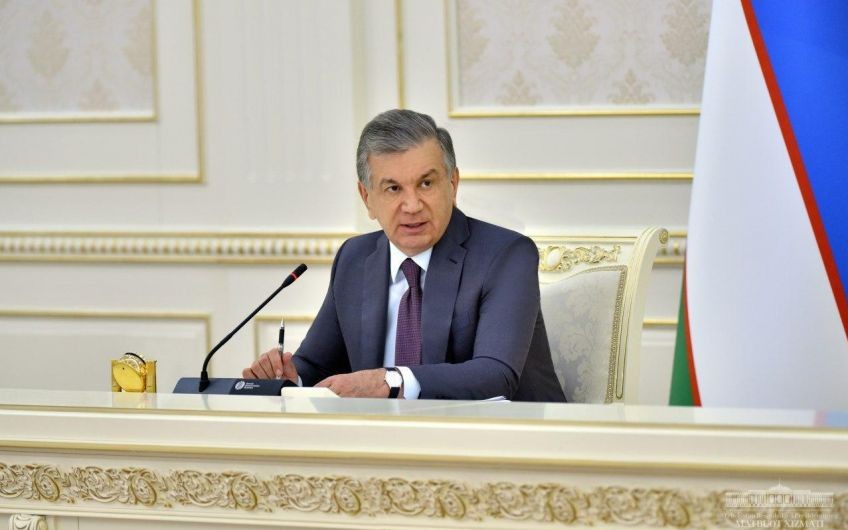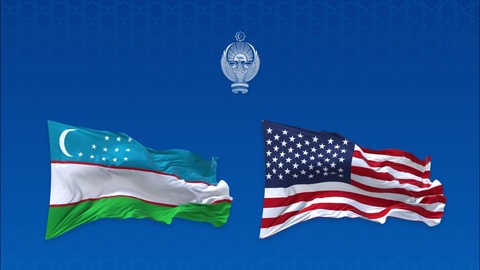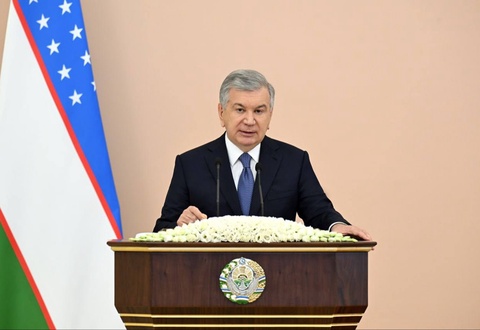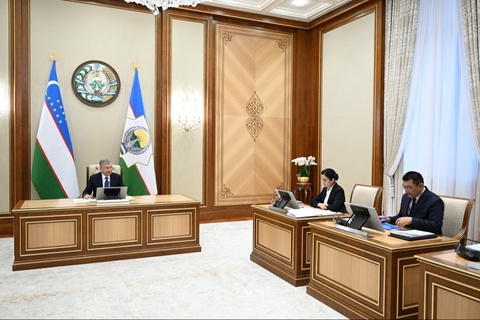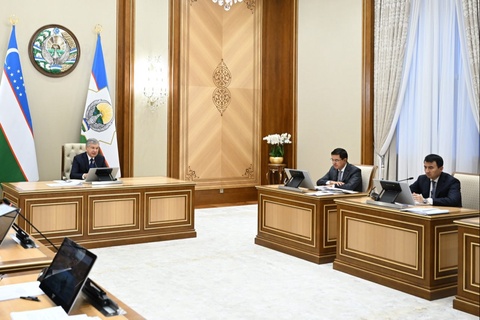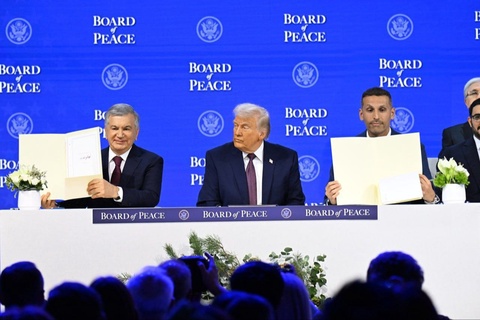The Head of the state touched upon the situation with coronavirus in the country. As noted, over the past ten days, infection was detected on average in 70-80 people per day, and therefore it is too early to indulge in calm.
Over the past month, about 8 thousand people arrived in Uzbekistan on 32 charter flights and more than 20 thousand – through border checkpoints. The disease was identified in many of them. Coronavirus was also detected in nearly 200 international freight drivers. Currently, 26 thousand people are home quarantined and 21 thousand in hospitals.
The need for strict observance of quarantine rules in the regions, cities and districts with “red” and “yellow” status was noted.
Unemployment and poverty growth in a pandemic remain a serious problem even in the most prosperous countries. The number of unemployed has increased in Uzbekistan. In addition, according to preliminary estimates, the pandemic can seriously affect the income of about 450 thousand families.
Ensuring employment and increasing incomes of the population are the priorities of the state policy in Uzbekistan. In accordance with this, comprehensive and regional programs were developed, the tasks of ministers, khokims and sector leaders were defined.
Within the framework of poverty reduction and the Nationwide Movement “Generosity and Support”, lists were formed to support low-income families. To date, 540 thousand families from these lists have received assistance in the amount of 307 billion UZS.
The Head of the state emphasized that the main goal is to employ at least one member of a poor family and bring it out of poverty, therefore it is necessary to deal with problems of each family and each citizen from this category individually.
“At this time of trials, it’s necessary not to chase numbers, but to work diligently to meet people’s needs”, said Shavkat Mirziyoyev.

At the meeting it was determined that the leaders of district (city) sectors will compile a list of the most needy families and develop a plan to rid them of poverty. Deputy khokims of the regions on economic issues and the makhalla will coordinate the work of sectors and commercial banks and will be responsible for implementation of social projects. The Republican headquarters, headed by the Deputy Prime Minister, will listen to their reports and involve ministries and agencies, commercial banks in solving problems.
This system will also become a solid foundation for the Unified Social Register. Responsible persons were instructed to fully implement the register by the end of the year at the level of ministries, regions, districts and makhallas. It was decided to test 4 world-recognized methods for calculating poverty lines and criteria in Tashlak district of Fergana region.
The Ministry of Economic Development and Poverty Reduction has been instructed to develop a normative-legal framework for a living wage and a minimum consumer basket by October 1 this year.
President Shavkat Mirziyoyev noted that a special approach is needed to develop the economy of territories with high unemployment and poor infrastructure, especially in border regions. In this regard, the Deputy Prime Ministers were instructed to develop, together with local khokimiyats, programs to increase employment and improve the living conditions of the population, and to develop infrastructure in such districts.
As is known, as a result of softening the quarantine measures, the activity of more than 17 thousand industrial and 10 thousand construction enterprises was resumed. But in most of them, cash flows decreased by 3 times compared with the period before the introduction of the self-isolation regime.
The Central Bank was instructed to identify the problems of enterprises with insufficient turnover of funds in the accounts and to assist them.
The Ministry of Employment and Labor Relations has been pointed out the possibility of attracting 300 thousand people to public work, employment of 265 thousand people, including providing employment for 18 thousand poor families by allocating 36 billion UZS of subsidies to private household plots from the Ministry’s fund.
An additional 1 trillion UZS were allocated for the implementation of the state program “Every family entrepreneur” to mitigate the consequences of the pandemic. In total, 4 trillion UZS are allocated for family business programs this year.
On behalf of the President, the allocation of loans under family business programs has been simplified.

It was noted that it is important to direct these funds to small, highly efficient production projects that guarantee job creation.
In addition, to date, 190 billion UZS have been allocated for handicraft. The pace of attraction of these funds in Navoi, Kashkadarya and Tashkent regions has been criticized.
This year it is planned to employ 145 thousand poor people through the implementation of 7.5 thousand regional projects in industry. In addition, measures were identified to create more than 31 thousand high-income jobs through the launch of 206 large production capacities worth about $11 billion. The Deputy Prime Minister, Minister of Investments and Foreign Trade was entrusted with the timely implementation of these projects.
There are many opportunities in agriculture to reduce poverty among the population. It was noted that in the first half of the year it is planned to provide employment for 25 thousand people by putting 38 thousand hectares of land into circulation and 45 thousand people by the end of the year by developing another 51 thousand hectares. Twenty thousand hectares of these lands will be transferred to low-income families.
It is also planned to allocate 120 thousand hectares released from grain for growing re-crops and creating a source of income for about 300 thousand families. In addition, 107 projects worth $965 million in cotton-textile clusters will serve to create more than 28 thousand new jobs. The State Committee on Veterinary and Livestock Development will provide 28 thousand low-income families with goats, 50 thousand families – birds, 100 thousand families – rabbits.
When considering opportunities in the construction industry, it was noted that 85 thousand people can be involved in the sphere at the expense of 3.6 trillion UZS allocated from the Anti-Crisis Fund.
Issues of social support for the population were discussed at the meeting. From the first days of quarantine, necessary measures were taken in this direction, and the number of recipients of social benefits increased by 10 percent.
Today, there are 155 thousand families that have lost the bread-winner, 81 thousand low-income families with 5 or more children, as well as 16 thousand lonely elderly people. However, not in all cases the allocated social assistance reaches the needy in full.
The Ministry for Supporting Makhallas and Family was given a strict order fairly and at the address to provide 992 billion UZS of additional funds allocated and the balance of 70 billion UZS in “Generosity and Support” Fund.
It was noted that within the framework of the documents adopted to provide social support to the population during the pandemic, by the end of the year more than 235 thousand families will receive financial assistance.
The issue of fully ensuring the need for basic types of food products and maintaining price stability was also addressed at the meeting.
At the meeting, it was noted that the production of poultry meat, rice and potatoes does not satisfy the current demand, instructions were given to increase the volume of harvesting these products. The expediency of applying the experience of foreign countries, in particular, the Dutch experience in potato growing and Vietnamese in rice growing and fish farming, was emphasized.
In addition, the presence of idle reserves in the agricultural sector was indicated. For example, once in Namangan and Navoi regions there were wool processing facilities. This industry also has the potential to provide jobs for many people, expand the range and increase the volume of export-oriented products. It was noted that the production of woolen shawls, carpets and other finished products should be an important area of self-employment of the population. Instructions were given to form appropriate projects.
At the videoconference, khokims, heads of ministries and commercial banks presented information on the number of jobs planned to be created in the first half of the year, and the number of poor families expected to be reduced in the same period, as well as plans for 9 months and a year.



